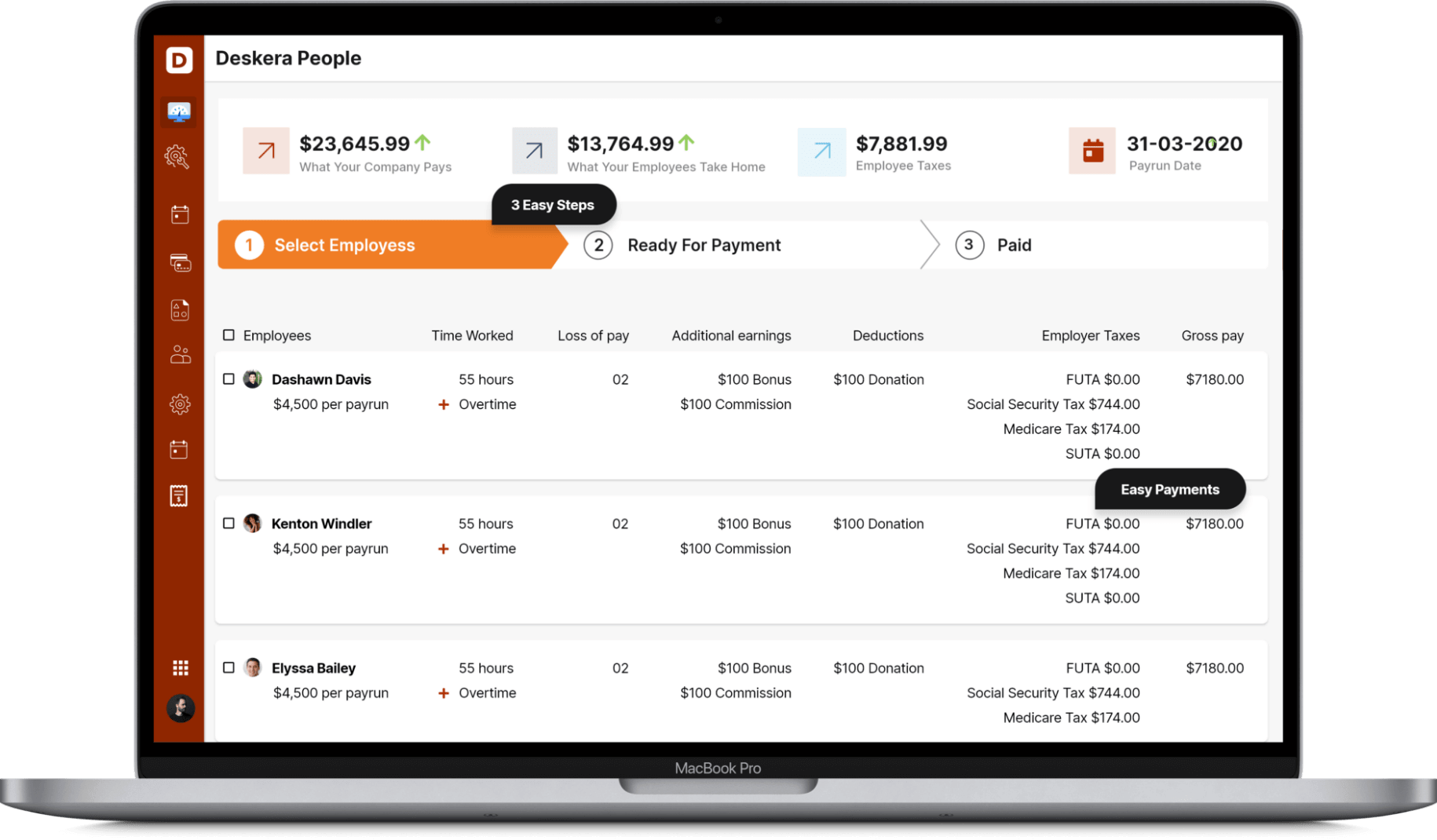Employee benefits are a critical component of any business’s success, especially in the United States. Benefits provide employees with additional compensation that goes beyond their base salary, helping them lead a secure and comfortable lifestyle.

This not only makes them feel valued and appreciated, but it also boosts morale and encourages loyalty. In turn, this helps businesses maintain a strong, productive workforce.
This article covers the following:
- Introduction to employee benefits
- What are the types of employee benefits?
- How to Maximize Your Benefits?
- What are the 17 employee benefits that are worth investing in?
- How can Deskera assist you?
Introduction to Employee Benefits
When it comes to the workplace, one of the most important aspects of any job is the benefits employees receive. Employee benefits are a form of compensation provided by employers to their employees in addition to their regular wages or salaries.
These benefits can range from health insurance, retirement plans, paid time off, and other forms of insurance. Employer-provided benefits are an essential part of any job, and they can help employees feel valued and secure in their positions.
Employee benefits can help employers attract and retain top talent. They are also an important factor in employee satisfaction and engagement, as well as attracting and retaining customers. In addition, employee benefits can help employers save money by reducing their payroll costs, as well as saving on taxes.
Employee benefits can help employers create a positive work environment and promote a healthy work-life balance. They can also help employers protect their business from potential legal issues and provide employees with a safety net in case of illness, injury, or other unexpected events.
This blog will explore the different types of employee benefits, the importance of offering them, and how employers can use them to create a successful workplace. We will also look at how employee benefits can help employers reduce costs and create a positive work environment. Finally, we will discuss how employers can ensure their employees are receiving the benefits they need and deserve.
Types of Employee Benefits
Health Insurance
Health insurance is one of the most popular employee benefits. It typically covers medical expenses and sometimes dental, vision, and prescription drug coverage.
Retirement Benefits
Retirement benefits are important for employees to plan for the future. Common retirement benefits include 401(k) plans, pension plans, and profit-sharing plans.
Paid Time Off
Paid time off includes vacation days, sick days, holidays, and personal days. This benefit allows employees to take time off to rest or take care of personal matters.
Work-Life Balance Benefits
Work-life balance benefits are designed to help employees manage their work and home life. These can include flexible work schedules, telecommuting, childcare, and family leave.
Disability Insurance
Disability insurance provides income protection in the event of an accident or illness that prevents an employee from working.
Wellness Benefits
Wellness benefits are designed to help employees lead healthier lifestyles. These can include gym memberships, health screenings, and other health-related activities.
Education Assistance
Education assistance is offered to help employees advance their skills and knowledge. It can include tuition reimbursement, mentorship programs, and professional development classes.
Employee Discounts
Employee discounts are offered to help employees save money. They can include discounts on products and services, as well as discounts at local businesses.
How to Maximize Employee Benefits?
Employee benefits are an important part of any job, providing employees with additional compensation and other perks that can help them to feel valued, motivated, and engaged in their work.
To maximize the value of employee benefits, employers should ensure that they are offering an attractive and competitive package that meets the needs of their workforce.
Assess Your Current Benefits Package
Take the time to assess what employee benefits you currently offer. Determine which benefits are most important to your current employees and identify any gaps in coverage. Doing this will give you a better idea of where you need to focus your efforts when it comes to increasing the value of your employee benefits package.
Research Other Companies
Take the time to research what other companies are offering in terms of employee benefits. This will give you a better idea of what is considered competitive in the current market and what other employers are doing to attract top talent.
Offer Flexible Benefits
To maximize the value of employee benefits, consider offering flexible benefits that allow employees to choose the benefits that are most important to them. This will allow them to customize their benefits package to better suit their individual needs.
Consider Non-Monetary Benefits
Non-monetary benefits, such as flexible work hours, remote work opportunities, and subsidized childcare, are becoming increasingly popular and can be extremely valuable to employees.
Encourage Use of Benefits
It’s important to make sure that employees are aware of the benefits that are available to them and to encourage them to take full advantage of them. This can be done through regular reminders and communication, as well as through incentives such as discounts on certain benefits.
17 Employee Benefits Worth Investing In
Health Insurance
Health insurance is one of the most important benefits that employees should invest in. Health insurance helps cover the costs of medical bills and other related expenses, allowing employees to seek medical care without worrying about the cost.
Dental Insurance
Dental insurance helps cover the costs of regular dental check-ups, as well as treatments for more serious conditions. This is an important benefit for employees, as it can help reduce the cost of dental care and keep employees healthy.
Vision Insurance
Vision insurance covers the costs of eye exams and corrective lenses, such as glasses and contact lenses. This is an important benefit for those who rely on corrective lenses to perform their jobs.
Retirement Plan
Retirement plans, such as 401(k)s, help employees save for the future. Employees can contribute to their retirement plan on a pre-tax basis, helping them save money and plan for their financial future.
Life Insurance
Life insurance helps provide financial security for employees and their families in the event of an unexpected death. Some employers offer life insurance as part of their benefits package, which can help provide peace of mind for employees.
Disability Insurance
Disability insurance helps cover the costs of lost wages and other expenses if an employee becomes disabled and is unable to work. This is an important benefit for employees, as it can help protect their financial security.
Long-Term Care Insurance
Long-term care insurance helps cover the costs of long-term care, such as nursing home care or home health care. This can be an important benefit for employees, as it can help protect their financial security.
Paid Time Off
Paid time off, such as vacation and sick days, help employees take a break from work and recharge. This is an important benefit for employees, as it can help them maintain a healthy work-life balance.
Flexible Spending Accounts
Flexible spending accounts, or FSAs, allow employees to set aside pre-tax money for certain medical and dependent care expenses. This is an important benefit for employees, as it can help reduce the cost of medical bills and dependent care.
Commuter Benefits
Commuter benefits help cover the costs of commuting to and from work, such as public transportation or mileage reimbursement. This is an important benefit for employees who rely on public transportation or have a long commute.
Wellness Programs
Wellness programs help encourage employees to lead healthier lifestyles, which can lead to improved productivity and reduced health care costs for employers. This is an important benefit for employees, as it can help them stay healthy and productive.
Education Assistance
Education assistance can help employees pursue higher education and professional development, which can lead to improved job performance. This is an important benefit for employees, as it can help them develop their skills and advance their careers.
Child Care Assistance
Child care assistance can help employees with the cost of child care, allowing them to focus on their work. This is an important benefit for employees with children, as it can help make work more manageable.
Onsite Amenities
Onsite amenities, such as cafeterias and fitness centers, can help make the workplace more appealing and enjoyable for employees. This is an important benefit for employees, as it can help make the workplace more enjoyable and productive.
Employee Assistance Program
Employee assistance programs, or EAPs, can help employees with personal and professional issues, such as stress, mental health, and financial problems. This is an important benefit for employees, as it can help them manage their personal and professional lives.
Employee Discounts
Employee discounts can help employees save money on products and services, such as cell phone plans and gym memberships. This is an important benefit for employees, as it can help them save money on everyday expenses.
Pet Insurance
Pet insurance helps cover the costs of veterinary care, allowing employees to provide necessary medical care for their pets. This is an important benefit for employees with pets, as it can help reduce the cost of pet care.
The time to assess, research, and enhance your employee benefits package, you can ensure that you are offering a competitive and attractive package that meets the needs of your workforce. This can help to create a more positive work environment and increase employee engagement and satisfaction
How Can Deskera Assist You?
Deskera People is a simple tool for taking control of your human resource management functions. The technology not only speeds up payroll processing but also allows you to manage all other activities such as overtime, benefits, bonuses, training programs, and much more. This is your chance to grow your business, increase earnings, and improve the efficiency of the entire production process.

Related Articles:











